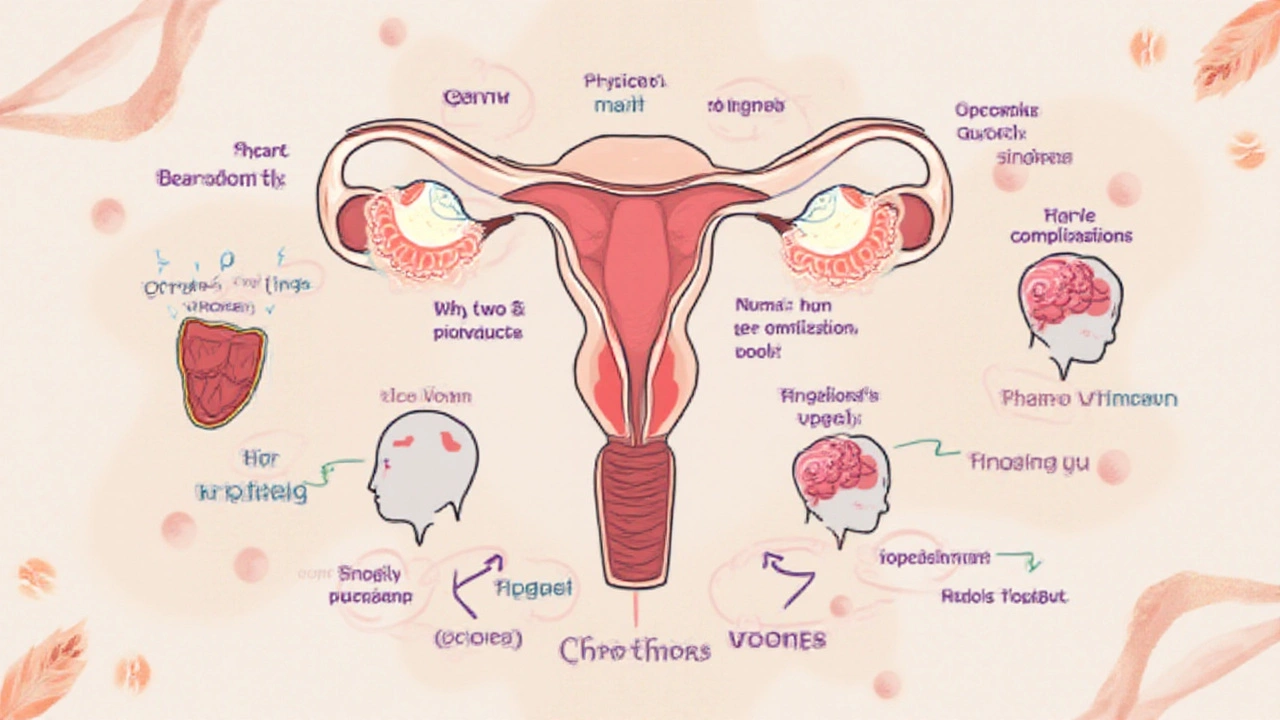
I've had more breakfast table conversations about IVF than I ever planned. It’s no secret that fertility issues hit hard, especially in circles where everyone suddenly seems to be having kids. When IVF enters the picture, what no one warns you about are the awkward side effects lurking behind all the optimism. Men and women alike are often left googling symptoms at 2 a.m., wondering if what they're experiencing is normal or something to worry about. If you’re curious about what IVF could actually do to your body—apart from the obvious—here’s the honest lowdown.
Common Physical Side Effects of IVF
The start of IVF is all about prepping the body. Hormone injections are at the heart of this; they’re designed to ramp up egg production. But those little vials pack a punch. For starters, most people report feeling bloated, crampy, and uncomfortably full. That’s your ovaries swelling from all the stimulation. According to a 2022 study from Australia’s Monash University, over 60% of women undergoing IVF experience moderate bloating.
While the injections are going in, bruising and redness where the needle passes are pretty standard. A tip from a friend: switching injection sites and applying a cool pack right after can help cut down on sore spots. Hot flashes aren’t reserved for menopause either—sudden waves of warmth, sometimes mistaken for anxiety or even sickness, are pretty common. And don’t be surprised if your breasts get tender or you feel fatigued—these are classic hormone rollercoaster effects.
After the egg retrieval procedure, which often feels more clinical than painful (thank you, light sedation), mild to moderate discomfort follows. Think period-like cramps or ache, possibly some spotting. Here’s a wild stat—a survey among fertility clinics in Auckland in 2023 pegged post-retrieval pain as "moderate" for 41% of patients. Nausea and abdominal pressure also aren’t rare after retrieval. Drinking fluids, light movement, and even gentle walks with my dog Charlie seem to help ease things off faster than bed rest alone.
Fields like IVF rarely shy away from more unique side effects. For example, headaches can show up randomly and feel intense. Digestive issues—constipation or diarrhea—sometimes hit, possibly because of stress, diet changes, or the medications themselves. Some women get acne flare-ups, new hair growth, or even mood swings that make PMS feel like a walk in the park. There’s no single list because everyone’s body reacts a bit differently.
| Common Side Effects | Estimated Frequency (%) |
|---|---|
| Bloating | 60 |
| Bruising at Injection Sites | 70 |
| Breast Tenderness | 45 |
| Fatigue | 38 |
| Mood Swings | 52 |
| Hot Flashes | 35 |
The months following embryo transfer, the hormonal support shifts while your body preps for potential pregnancy. Cramping, bloating, and fatigue may linger, sometimes joined by light bleeding. Every little twinge can cause a panic—it’s easy to spiral when waiting for that all-important pregnancy test.

Emotional and Mental Health Effects of IVF
One thing many folks underestimate is just how much IVF toys with your emotions. Hormones, high hopes, and repeated disappointments can throw someone into a stress tailspin. During my last visit to the clinic, I saw grown adults tearing up in hallways—most not even sure if they were happy, frustrated, or just exhausted from the wait.
Let’s be real: IVF is anxiety-inducing. There’s waiting after each step—waiting for your cycle, waiting for eggs, waiting after transfer. These waiting periods ramp up stress, leading to sleepless nights, trouble focusing, and even breakdowns for some. Couples often find themselves getting short with each other, and single parents-by-choice can feel isolated. Group chats turn into support groups, and sometimes a good meme is the only thing that lightens the mood.
Hormone changes contribute to emotional swings too. Feeling elated one hour and weepy the next is common. If depression or deep sadness surfaces, know you’re not alone. In 2023, a New Zealand survey found 47% of IVF patients reported "significant emotional distress" during treatment. Therapy helps; so does honest conversation, even if it’s just venting about how unfair the whole thing feels.
Some tips, hard-won by friends and support groups:
- Talk openly with your partner, friends, or a therapist—don’t bottle it up.
- Don’t torture yourself by scrolling IVF forums at midnight. If you must, stick to positive or educational ones.
- Focus on routines—walking the dog, cooking, gardening—simple everyday wins keep you grounded.
- Consider journaling, meditation, or mindfulness apps. Even ten mindful breaths can take the edge off.
- Celebrate small milestones—egg retrieval, embryo transfer, even just making it to injection number ten without swearing.
Relationship strain is very real—sex can lose its spark, money arguments flare, and tension builds over things as silly as whose turn it is to make dinner. This isn’t a failure on your part; it’s okay to ask for a break or take time off from heavy conversations.
For some, IVF triggers old wounds—past miscarriages, lost hopes, or family pressure all bubble up. If you have previous trauma, tell your doctor. Many clinics now offer counseling alongside treatment, and some insurance (here in NZ at least) even covers it.
Lastly, don’t compare your timeline or side effects to anyone else’s. That social media couple who "only did one round" is the exception, not the rule. You never really know what anyone else is facing.

Rare but Serious Risks: What Needs Attention
Most IVF side effects fade after drugs stop or a menstrual cycle begins. But a few risks need a more serious heads-up. Ovarian Hyperstimulation Syndrome (OHSS) is one—if bloating, severe pain, sudden weight gain, or trouble breathing hit, that’s an emergency. OHSS happens in about 3% of IVF cycles; it’s most common in women under 30 and those with polycystic ovary syndrome (PCOS).
There’s a mild version (just bloating, discomfort) and a severe form (hospitalization needed). Drinking lots of fluids, keeping active, and regular check-ins with your clinic are key, but don’t play tough if you’re worried—go in.
Other less common risks:
- Infection after egg retrieval. Clinics here in Auckland keep things sterile, but fever, chills, or pain should trigger a call to your doctor.
- Bleeding or damage to pelvic organs—rare, but not impossible. Blood in urine or severe pain shouldn’t be ignored.
- Allergic reactions to medications (especially antibiotics or anesthesia).
- Blood clots—particularly for women with clotting disorders or on long bed rest.
Long-term data about cancer risk after IVF is still debated. One large Danish study in 2024 found no significant increase in ovarian cancer among IVF patients compared to the general population, which is reassuring. However, some research hints at slightly higher rates of borderline tumors, especially after multiple cycles, so regular checkups matter.
Ectopic pregnancy—when the embryo implants outside the uterus—is more likely after IVF. It affects about 2% of IVF pregnancies versus 1% of all pregnancies. If you notice severe pain, shoulder pain, or heavy bleeding, it’s a red flag.
Finally, there’s the psychological aftermath. Post-IVF depression and anxiety rates climb, especially if cycles fail. Taking time off after a failed cycle, seeking support, and being gentle with yourself make a difference. Don’t force yourself through another cycle without proper reset time.
As a final tip? Keep your medical team updated about any unusual symptoms, no matter how trivial they seem. The difference between a simple side effect and a serious complication can be small, but early intervention matters.
In short, while IVF’s side effects can be daunting, knowing what’s normal—and what’s not—can help you stay in control. Whether you’re prepping for your first round, deep in injections, or supporting someone you love, understanding the ups and downs is half the battle won.





